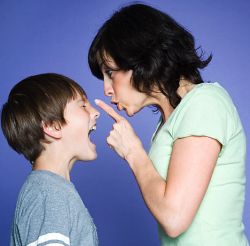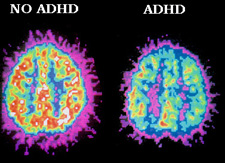Meditation for Kids with ADHD
January 5, 2009 Written by JP [Font too small?]Children are among the most vulnerable segment of the health care population. They rely on the good judgment and the care of adults to guide them to the best and safest possible treatments. Part of our responsibility, as adults, is to inform ourselves so that we can participate in a constructive way in that equation.
One controversial area of pediatric (children’s) medicine is in the treatment of condition called Attention Deficit/Hyperactivity Disorder (ADHD). Symptoms of ADHD often include: hyperactivity, impulsive behavior and the inability to concentrate. In some instances, the symptoms extend beyond that into areas such as anti-social activities and even aggression.
 Modern medicine often treats ADHD with powerful stimulant medications. Many conventional doctors believe this is the simplest and most effective manner to control the disruptive symptoms of this common condition. And parents often trust that this is the best approach to deal with their children. But what if there was an effective, natural alternative that didn’t present the same safety issues as the stimulants? In today’s blog, I’m going to briefly outline one unconventional option that may be worth considering.
Modern medicine often treats ADHD with powerful stimulant medications. Many conventional doctors believe this is the simplest and most effective manner to control the disruptive symptoms of this common condition. And parents often trust that this is the best approach to deal with their children. But what if there was an effective, natural alternative that didn’t present the same safety issues as the stimulants? In today’s blog, I’m going to briefly outline one unconventional option that may be worth considering.
Meditating on a More Peaceful Mind
A study was just reported in the online journal, Current Issues in Education, about the beneficial effects of Transcendental Meditation (TM) in the management of anxiety, poor behavior and concentration in children diagnosed with ADHD.
TM is a simple form of meditation that requires at least two 10 minute sessions a day. In those sessions, you simply sit in a comfortable position, close your eyes and silently (in your mind) repeat a sound or word(s). For instance, you may use a “mantra” like “OM” or “peace” or “I want to feel calm”. The choice of a mantra is either assigned by a TM instructor or you can choose it yourself.
The potential problem with using meditation in ADHD is that ADHD sufferers already have a hard time concentrating. So, sitting quietly for 10 minute periods could be challenging. But, the researchers of this study did not find that to be a problem. In fact, they discovered that the children learned the TM practice easily.
According to the lead author of the study, Sarina J. Grosswald Ed.D., “The effect was much greater than we expected”. Improvements were found in attention, behavior regulation, memory and organization.
This is considered to be an exploratory study because it only included 10 children with ages ranging from 11-14. All the children were on medications, but they were still having difficulty in school.
The specifics of the study are as follows:
- The students practiced 10 minutes of TM twice daily at school.
- Within three months, the students and teachers began reporting a positive outcome – less stress and anxiety.
- The teachers also noted that, at the three-month mark and beyond, they were able to teach more material and observed that their pupils were learning more efficiently.
 In the discussion of the study results, the authors offer these observations: “The findings of this study also have promising implications for what is commonly referred to as the ‘epidemic of student stress,’ which manifests as affective disorders, problems with behavioral control, substance abuse and self-injury. Since students with ADHD experience higher levels of stress than typical students, a technique that can help normalize their stress response and provide increased self-control would be extremely valuable.”
In the discussion of the study results, the authors offer these observations: “The findings of this study also have promising implications for what is commonly referred to as the ‘epidemic of student stress,’ which manifests as affective disorders, problems with behavioral control, substance abuse and self-injury. Since students with ADHD experience higher levels of stress than typical students, a technique that can help normalize their stress response and provide increased self-control would be extremely valuable.”
I think this research provides a very strong rationale for considering a mind-body approach for the management of ADHD and related groups of symptoms. If we can help our children cope with stress more effectively, the benefits could truly be far reaching. And what’s the downside of trying a safe and natural exercise such as this? I can’t think of any.
Meditation Update from 05/24/09: How Meditation Works
Be well!
JP
Tags: ADHD, Meditation
Posted in Alternative Therapies, Children's Health, Mental Health

January 6th, 2009 at 10:06 pm
Thanks for the helpful information. It would be a terrific trial for a majority of my current students~!
I will pass along these suggestions gladly, also!
Keep up the excellent work providing us with attainable [assistance] goals to our all-too-common human afflictions-!
January 6th, 2009 at 10:24 pm
Thanks for such positive feedback, Maria Lisa.
I hope the information will somehow help you, your students and their families.
Be well!
JP
January 19th, 2009 at 5:04 pm
great!! will try it w my 3 “typical” sons really helpful!!! thx
January 19th, 2009 at 9:28 pm
I hope you find great success with your boys, Julie.
Please let us know how it goes.
Be well!
JP
June 28th, 2009 at 5:53 am
ADHD is a difficult conditions, if this methods work, it will helps a lot of people out there.
Thanks JP.
June 28th, 2009 at 2:36 pm
I hope it does help some children, parents and teachers out there. Maybe we’ll get some feedback about that in the future.
Be well!
JP
January 5th, 2010 at 8:36 pm
this will help me alot i hope because i have adhd and i do get stressed outabout alot of stuff i sould not get stressed about. hope it works, thanks. 🙂
January 5th, 2010 at 9:38 pm
I hope so too, Wesley!
Hang in there and keep looking for the right solution until you find it. I’m confident that you’ll get there!
If you need extra support, stop by here from time to time and look around. I often add information about ADHD on this site. 🙂
Be well!
JP
May 3rd, 2015 at 6:43 pm
Update 05/03/15:
http://www.ctcpjournal.com/article/S1744-3881%2815%2900029-8/abstract
Complementary Therapies in Clinical Practice – Published Online: April 18, 2015
Ginkgo biloba in the treatment of attention-deficit/hyperactivity disorder in children and adolescents. A randomized, placebo-controlled, trial
Objective: To evaluate the efficacy of Ginkgo biloba as a complementary therapy for attention-deficit/hyperactivity disorder (ADHD).
Methods: Children and adolescents with ADHD received methylphenidate (20–30 mg/day) plus either G. biloba (80–120 mg/day) or placebo for 6 weeks. Parent and teacher forms of the ADHD Rating Scale-IV (ADHD-RS-IV) were completed at baseline, week 2, and week 6. Treatment response was defined as 27% improvement from baseline in the ADHD-RS-IV.
Results: Compared with placebo, more reduction was observed with G. biloba regarding ADHD-RS-IV parent rating inattention score (−7.74 ± 1.94 vs. −5.34 ± 1.85, P < 0.001) and total score (−13.1 ± 3.36 vs. −10.2 ± 3.01, P = 0.001) as well as teacher rating inattention score (−7.29 ± 1.90 vs. −5.96 ± 1.52, P = 0.004). Response rate was higher with G. biloba compared with placebo based on parent rating (93.5% vs. 58.6%, P = 0.002). Conclusions: The G. biloba is an effective complementary treatment for ADHD. Further studies with longer treatment duration are warranted in this regard. Be well! JP
May 13th, 2015 at 6:14 pm
Update 05/13/15:
http://jad.sagepub.com/content/early/2015/02/02/1087054715569282.abstract
J Atten Disord. 2015 Feb 2. pii: 1087054715569282.
Effects of Physical Exercise Intervention on Motor Skills and Executive Functions in Children With ADHD: A Pilot Study.
OBJECTIVE: This study examined the effect of a 12-week table tennis exercise on motor skills and executive functions in children with ADHD.
METHOD: Fifteen children with ADHD received the intervention, whereas 15 children with ADHD and 30 typically developing children did not. The Test of Gross Motor Development-2, Stroop, and Wisconsin Card Sorting Test (WCST) were conducted before and after the intervention.
RESULTS: After the intervention, the ADHD training group scored significantly higher in the locomotor as well as object-control skills, Stroop Color-Word condition, and WCST total correct performance compared with the ADHD non-training group, and we noted improvements in the locomotor as well as object-control skills, Stroop Color-Word condition, and three aspects of the WCST performances of the ADHD training group over time.
CONCLUSION: A 12-week table tennis exercise may have clinical relevance in motor skills and executive functions of children with ADHD.
Be well!
JP